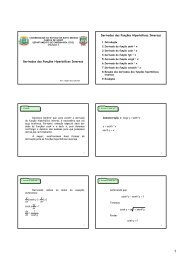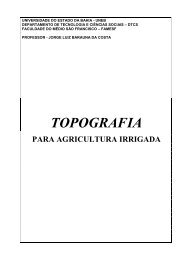Anuário Brasileiro do Arroz 2011 - Unemat
Anuário Brasileiro do Arroz 2011 - Unemat
Anuário Brasileiro do Arroz 2011 - Unemat
You also want an ePaper? Increase the reach of your titles
YUMPU automatically turns print PDFs into web optimized ePapers that Google loves.
8<br />
Sílvio Ávila<br />
What will tomorrow be like?<br />
Brazil has an undeniable vocation<br />
for rice farming, a peculiarity that reaffirms<br />
its agribusiness expertise as<br />
a whole. Some of the best and most<br />
efficient technologies for the cultivation<br />
of this cereal crop, in terms of<br />
social and environmental viewpoints,<br />
are now used on fields of different<br />
profiles, spread across the vast national<br />
territory. And, although the<br />
highlands in the Center-West Cerra<strong>do</strong><br />
region show good productivity rates<br />
with dryland varieties, and even<br />
if the mea<strong>do</strong>wlands of the North<br />
Atlantic coastal areas have become<br />
part of the process, it is a fact that<br />
now rice rhymes with South. And the<br />
cereal seems to be very fond of irrigated<br />
plantations.<br />
Rio Grande <strong>do</strong> Sul, located in the<br />
Far South, accounts for 65% of the<br />
2010/11 crop. Santa Catarina, the<br />
neighboring state, expands significantly<br />
the southern share. Both guarantee<br />
<strong>do</strong>mestic supplies and have surpluses<br />
that are exported.<br />
It is an impressive superiority,<br />
which even calls for careful assessment<br />
of the factors that lead to such<br />
outstanding performance: if, on the<br />
one hand, competence stands to rea-<br />
son, so to speak, on the other hand,<br />
it might suggest a certain dependency<br />
of the region on this cereal, in addition<br />
to the natural vocation of certain<br />
areas. And, as things stand now, there<br />
will always be pros and cons.<br />
The first conclusion is that, in a<br />
year of fully favorable climatic conditions<br />
and fields established on large<br />
scale, harvest will be abundant. This<br />
land is really suitable for rice. Not by<br />
chance, the crop is to be concluded<br />
with new record production volumes.<br />
The problem in such a scenario,<br />
where global stocks are enough to<br />
meet demand, surfaces at the moment<br />
remuneration is evaluated. In<br />
spite of all precautions regarding production<br />
cost control, and although using<br />
the most efficient economic return<br />
technologies, the bumper crop weighs<br />
heavily and prices plummet. This is<br />
what is happening.<br />
This is in fact the complex problem<br />
the rice production chain is now facing.<br />
And in this case it is not just the<br />
producer’s problem, it is also a government<br />
concern, responsible for assuring<br />
enough supply to meet what<br />
society demands; and it is not just the<br />
mission of a single country, but of all<br />
countries where rice is a staple that<br />
people consume almost daily.<br />
Can we afford not to produce rice?<br />
What could be <strong>do</strong>ne for this cereal<br />
to remunerate the producers without<br />
overburdening the consumers?<br />
How to control the balance of trade,<br />
considering that Brazil is a relevant<br />
importer and now also an exporter<br />
of this cereal? And, especially, how<br />
to keep growers motivated in light<br />
of a lush harvest, while the money<br />
jingling in their pockets is far from<br />
bringing satisfaction?<br />
There are many variables involved.<br />
None of them oversha<strong>do</strong>w the importance<br />
of rice on the dinner table,<br />
nor the incredible capacity of Brazil<br />
to seed and harvest this cereal.<br />
Nonetheless, agriculture is business, a<br />
fact that nobody can deny. And when<br />
it comes to business, it is not a matter<br />
of accepting losses, the fact is, nobody<br />
CAN AFFORD to lose.<br />
The scenario of the next crop will<br />
inevitably depend on the solution to<br />
this intricate equation between cost<br />
and benefit, harvest and profit and<br />
between <strong>do</strong>mestic market and exports.<br />
What will tomorrow be like?<br />
That’s what we all would like to know.


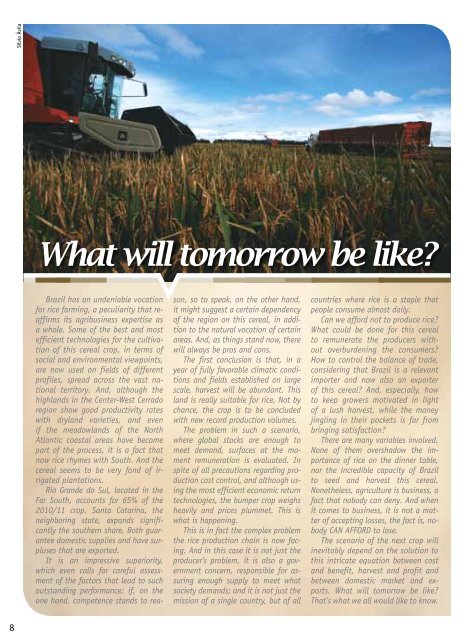
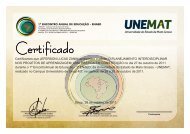
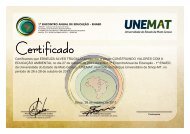
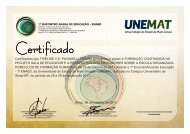
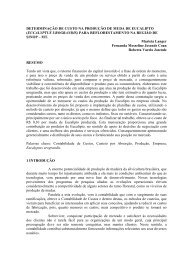
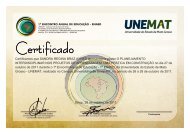
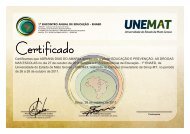
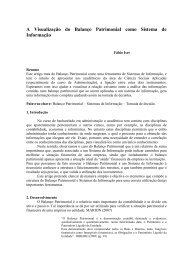
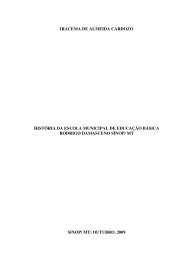

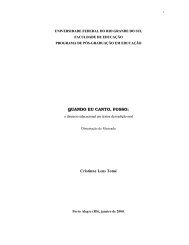
![Aula 31 - Funções Hiperbólicas [Modo de Compatibilidade] - Unemat](https://img.yumpu.com/14334654/1/184x260/aula-31-funcoes-hiperbolicas-modo-de-compatibilidade-unemat.jpg?quality=85)

![Aula 31 - Funções Hiperbólicas [Modo de Compatibilidade] - Unemat](https://img.yumpu.com/14332146/1/190x135/aula-31-funcoes-hiperbolicas-modo-de-compatibilidade-unemat.jpg?quality=85)
